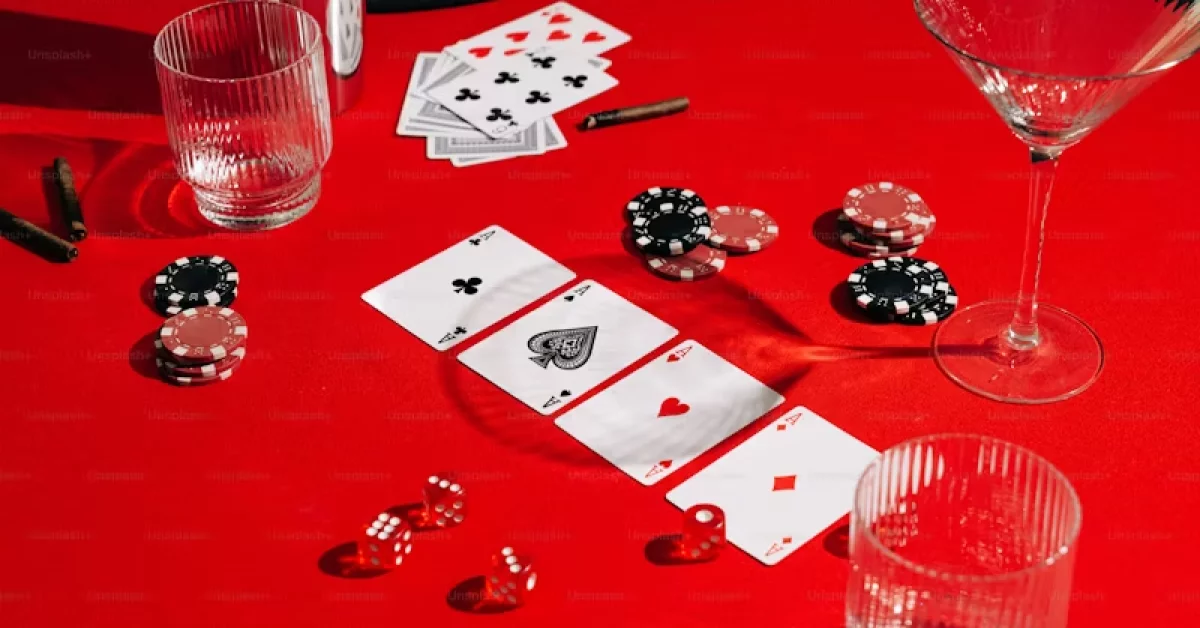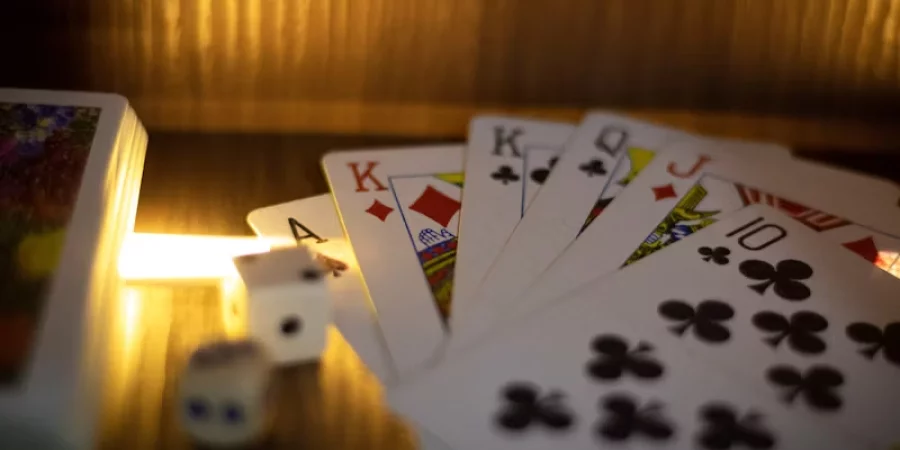Poker Dice Rules: A Comprehensive Guide

Are you looking for a fun and engaging game that combines the excitement of poker with the simplicity of dice? Look no further than poker dice! This classic game has been entertaining players for generations, offering a unique twist on traditional poker. In this comprehensive guide, we'll dive deep into the world of poker dice, exploring its rules, strategies, and variations. Whether you're a seasoned player or a curious beginner, you'll find everything you need to know about this captivating game.
What is Poker Dice?
Poker dice is a game that blends elements of traditional poker with the randomness of dice rolling. Instead of using a standard deck of cards, players roll five specially marked dice to create poker-style hands. Each die typically features the following faces: 9, 10, Jack, Queen, King, and Ace. The objective is to roll the best possible poker hand within a set number of rolls.
But how exactly does it work? Let's break down the basic rules and get you started on your poker dice journey.

Basic Poker Dice Rules
Setting Up the Game
Before you start rolling those dice, you'll need to gather a few things:
- A set of five poker dice
- A dice cup (optional, but recommended)
- A flat surface to roll on
- A scoresheet (if playing multiple rounds)
Once you have these items, you're ready to begin. But who goes first? A common method is to have each player roll one die, with the highest roll starting the game.
Rolling the Dice
Now, here's where the fun begins! Each player gets up to three rolls per turn to create the best possible poker hand. Here's how it typically works:
- On your first roll, you throw all five dice.
- After examining your roll, you can choose to keep any number of dice and re-roll the rest.
- On your third and final roll, you make your last attempt to improve your hand.
Remember, you don't have to use all three rolls if you're happy with your hand earlier. Sometimes, luck is on your side right from the start!
Scoring Hands
Once all players have completed their turns, it's time to compare hands. The ranking of hands in poker dice is similar to traditional poker, with a few adjustments due to the limited number of faces on the dice. Here's the ranking from highest to lowest:
- Five of a Kind (e.g., five Aces)
- Four of a Kind
- Full House (three of one face, two of another)
- Straight (five sequential faces, e.g., 9-10-J-Q-K)
- Three of a Kind
- Two Pair
- One Pair
- High Card (when no other combination is made)
In case of a tie, the hand with the highest-ranking dice wins. For example, four Kings would beat four Queens.

Advanced Poker Dice Rules and Variations
Now that you've got the basics down, let's explore some advanced rules and popular variations that can add even more excitement to your poker dice games.
Poker Dice Bluffing
Want to add a layer of strategy and psychological warfare to your game? Try incorporating bluffing! Here's how it works:
- Players take turns rolling their dice in secret, using a dice cup or their hands to conceal the results.
- After each roll, players can announce any hand they claim to have rolled.
- The next player can either challenge the claim or accept it and try to beat it with their own roll.
- If a challenge is made and the player was bluffing, they lose the round. If they weren't bluffing, the challenger loses.
According to experts who write for us on poker and gambling, this variation adds a whole new dimension to the game, making it more about reading your opponents and less about pure luck.
Progressive Poker Dice
Looking for a longer, more involved game? Progressive poker dice might be just what you're after:
- Players agree on a target hand (e.g., Full House) before starting.
- Each round, players try to roll the target hand or better within three rolls.
- If no one succeeds, the target hand becomes easier for the next round (e.g., from Full House to Three of a Kind).
- The game continues until someone rolls the target hand or better, winning the game.
This variation can lead to exciting, prolonged matches as players chase increasingly attainable goals.
Team Poker Dice
Who says poker dice has to be every player for themselves? Try this team-based variation:
- Divide players into two or more teams.
- Each team member takes turns rolling.
- Teams can strategize on which dice to keep or re-roll.
- The team with the best hand at the end of each round scores a point.
- Play continues until a predetermined score is reached.
This cooperative approach adds a social element to the game and can be great for parties or family game nights.

Strategies for Winning at Poker Dice
While poker dice involves a significant element of chance, there are strategies you can employ to improve your odds of success. Let's explore some tips to help you up your game:
Know Your Probabilities
Understanding the likelihood of rolling certain combinations can inform your decision-making. For example:
- The odds of rolling a Straight on your first roll are about 3.7%
- You have roughly a 15.4% chance of rolling Three of a Kind on your first throw
- The probability of rolling at least One Pair on your initial roll is about 46.3%
Knowing these probabilities can help you decide whether to keep certain dice or risk a re-roll.
Play the Odds
When deciding which dice to keep, consider the potential outcomes:
- If you have two pairs, it's often better to keep both pairs and re-roll the fifth die for a chance at a Full House.
- With three of a kind, re-rolling the other two dice gives you a shot at Four of a Kind or a Full House.
- If you're one card away from a Straight, it's usually worth re-rolling to try and complete it.
Read Your Opponents
In variations that involve bluffing, pay attention to your opponents' behavior and betting patterns. Are they consistently aggressive? Do they tend to play conservatively? Use this information to inform your own strategy.
Manage Your Rolls
Remember, you don't always have to use all three rolls. If you've got a strong hand early, it might be better to stick with it rather than risk losing it for a marginally better outcome.
Hosting a Poker Dice Tournament
Ready to take your poker dice game to the next level? Why not host a tournament? Here are some tips to make your event a success:
Setting Up the Tournament
- Decide on the format (single elimination, double elimination, or round-robin).
- Determine the number of rounds and scoring system.
- Create a schedule and bracket if necessary.
- Prepare scoresheets and any necessary equipment.
Rules and Regulations
- Clearly communicate the specific rules and variations you'll be using.
- Establish a time limit for each turn to keep the game moving.
- Decide how ties will be handled (e.g., sudden death roll-off).
- Consider having an impartial judge to settle any disputes.
Prizes and Incentives
- Offer prizes for the top finishers to increase competition.
- Consider additional awards like "Best Bluff" or "Most Improbable Comeback" to keep things fun.
- Provide refreshments to keep players energized throughout the tournament.
The History and Cultural Impact of Poker Dice
Poker dice isn't just a fun game – it's got a rich history and has made its mark on popular culture. Let's take a quick look at where this game came from and how it's influenced the world around us.
Origins of Poker Dice
The exact origins of poker dice are a bit murky, but the game is believed to have evolved from earlier dice games in the late 19th century. It gained popularity in the United States during the early 20th century, often played in bars and social clubs alongside traditional card poker.
Poker Dice in Popular Culture
Over the years, poker dice has popped up in various forms of media:
- In literature, poker dice games have been featured in mystery novels as a plot device.
- Several films have included poker dice scenes, often to establish a character's gambling prowess or to create tension.
- Video games have incorporated poker dice as mini-games or side quests, introducing the concept to new generations of players.
Conclusion: Why Poker Dice Continues to Captivate Players
As we've explored in this guide, poker dice offers a unique blend of chance, strategy, and social interaction that keeps players coming back for more. Its simple rules make it accessible to beginners, while the potential for advanced strategies and variations provide depth for more experienced players.
Whether you're looking for a quick game to play during a break, a fun addition to game night, or a new competitive challenge, poker dice has something to offer. Its portability and minimal equipment requirements make it an ideal choice for travel or impromptu gaming sessions.
So why not give poker dice a try? Gather some friends, roll those dice, and discover for yourself why this classic game continues to captivate players around the world. Who knows – you might just find your new favorite pastime!
Remember, as with any form of gambling or gaming, always play responsibly and within your means. The true joy of poker dice lies in the fun of playing, not in high-stakes betting. So roll those dice, enjoy the company of your fellow players, and may luck be on your side!